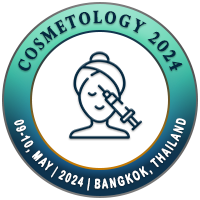.jpg)
Elena Zubareva
Omsk State Medical University, Russian FederationTitle: Acne maintenance therapy
Abstract
Acne is a chronic inflammatory skin disease. Dermatosis occupies one of the leading places in terms of prevalence and is an important medical and social problem. Based on the research results, a systematization of the modern possibilities acne maintenance therapy was carried out, which should begin after achieving treatment goals. The main directions of maintenance therapy for chronic dermatosis are identified, adherence to which
allows achieving stable remission. A literary review of many years of international experience of dermatologists and cosmetologists regarding the triggers of this disease is presented. Recent studies regarding Cutibacterium acnes indicate the leading role of a strong balance between representatives of its phylotypes and the skin microbiota, the loss of which, together with the activation of innate immunity, can lead to exacerbation of acne. It is constantly changing, potentially being influenced by external (mechanical factors, comedogenic cosmetics, aggressive detergents, medications, diet) and internal factors (hormonal or genetic factors). The skin microbiome is the collective genome of the local microbial inhabitants (viruses, bacteria, fungi and parasites), also called microbiota, present on the skin and its appendages. It controls the balance of
microbiota and transient microbial colonization, and also supports the innate immunity epidermidis limits the skin by various strains of Cutibacterium acnes. In a balanced skin microbiome, Staphylococcus epidermidis limits the skin by various strains of Cutibacterium acnes. Conversely, Cutibacterium acnes limits the proliferationof Staphylococcus aureus and of the Staphylococcus pyogenes while maintaining an acidic pH of the hair follicle through the hydrolysis of sebum triglycerides and the secretion of propionic acid. Recent studies regarding Cutibacterium acnes indicate the leading role of a strong balance between representatives of its phylotypes and the skin microbiota, the loss of which, together with the activation of innate immunity, can lead to exacerbation of acne. The role of dermatocosmetics in dermatology, and acne in particular, is becoming increasingly important. It is important for dermatologists to understand the mechanisms of action of traditional and new ingredients in the pathogenesis of acne in order to effectively counsel patients on their use.
Biography
Elena Zubareva has completed his PHD at the age of 29 years from Omsk State Medical University, Russian Federation. She is an assistant professor at the Department of Dermatovenereology and Cosmetology, Omsk State Medical University, Russian Federation. She has over 20 publications that have been cited over 150 times, and hеr publication h-index is 4. She is the Chairman of the Omsk Regional Branch of the Russian Society of Dermatovenerologists and Cosmetologists.

